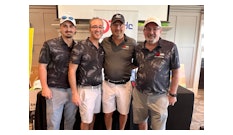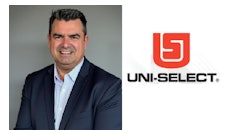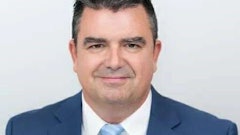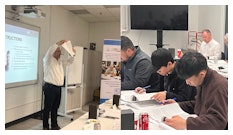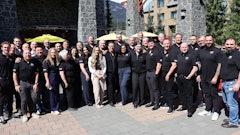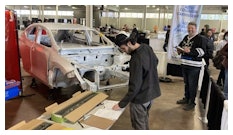
Toronto, Ontario — Seeing Canada’s automotive industry businesses navigate the COVID-19 pandemic has been nothing short of inspiring.
Whether your business is a small shop servicing a rural Canadian community or a global supplier sending equipment to every corner of the globe, you should commend yourself for making it through this rollercoaster of a year.
Take a gander through Collision Repair‘s most popular Tuesday Tickers of 2020 for a handle on how some of Canada’s top industry players fared this year.
Toronto, Ontario — In this week’s Tuesday Ticker, Atlantic Canada’s Steele Auto Group forges ahead with U.S. expansions, Canadian drivers make consider some seedy financial choices amid the pandemic and Tesla joins the S&P Index as one of the U.S.’s 500 largest publicly traded companies.
Step up for Steele
Dartmouth, Nova Scotia-based Steele Auto Group has been forging ahead with its U.S. expansions, even in the face of nationwide slumps and a surge in COVID-19 cases across North America.
The group announced last week that it had secured the purchase of a Chrysler-Jeep-Dodge-Ram dealership in Lockhart, Texas, and another facility in Gonzales, Texas. The stores are about 55 kilometres apart, said the company, while both are approximately the same distance from Austin, Texas and 11.5 km from San Antonio.
Steele purchased the facilities from the Benny Boyd Auto Group, upping its tally of Texas stores to three. Steele purchased its first U.S. store—located in Luling, Texas—in February 2020.
Looming loans
A recent report analyzing the internet search trends of Canadians suggests that a number of drivers are considering some seedy financial options, according to observers.
The number of searches involving car title loans has almost tripled in Canada in the March-to-September period this year to nearly 17,000 per month, compared with about 5,900 searches per month in the same time period a year earlier, according to SEMrush.
The Boston, Massachusetts, based marketing firm that studies Internet search trends said Canadian searches for payday loans, meanwhile, fell by 43 percent to 22,900 from 39,700 during the same period, which was marked by millions of people losing their jobs as non-essential stores and industries were forced to close in an effort to contain the spread of the COVID-19 virus.
“The most surprising thing we noticed was an increase in search demand for car title loans which is, I think, quite unique for Canada compared to the United States, where we didn’t see this type of increase,” said Eugene Levin, chief strategy officer for SEMrush.
He said he doesn’t know why U.S. searches didn’t also rise but suggested a possible explanation for the increase in searches for car title loans and a corresponding drop in payday loans in Canada could be that the potential applicants have a car, but no job.
A car title loan works on the same basis as a home equity loan. They are billed as short term affairs, secured by a lien on the vehicle. In the event of nonpayment or default by the borrower, the lender can repossess the vehicle in order to recoup their money.
Tesla at the top
Tesla is set to join the S&P 500 (Standard and Poor 500) at the close this Friday, while S&P Dow Jones Indices said it will be removing Apartment Investment and Management Co. from its benchmark index to make way for the EV automaker.
S&P Dow Jones Indices previously announced on Nov. 16 that Tesla would join the S&P 500. Tesla’s size — it’s the largest company ever to be added to the benchmark index — prompted the index provider to seek feedback from the investment community over whether to add Tesla all at once or in two separate tranches.
Tesla will also be added to the S&P 100, replacing Occidental Petroleum Corp., S&P said on Friday. Occidental will remain in the S&P 500, and Apartment Income REIT Corp. will replace Dunkin’ Brands Group Inc. in the S&P MidCap 400 Index.
The S&P Index is a market-capitalization-weighted index of the 500 largest U.S. publicly traded companies. The S&P is a float-weighted index, meaning company market capitalizations are adjusted by the number of shares available for public trading.
Toronto, Ontario — April 28, 2020 — In this week’s Tuesday Ticker: around the globe, businesses in the automotive sector see a light at the end of the coronavirus tunnel, but speedbumps are ahead.
Sharp Restart
Ontario’s auto sector is preparing to resume its operations after the coronavirus lockdown period ends.
Magna International has announced plans to reopen its plants on May 4. Despite concerns from Provincial officials about the date, the news has been met with cautious optimism from investors. Magna’s stock has continued to be stable, trading around $50 per-share.
It is not the only business planning to revive its Ontario operations in early May.
Toyota Canada intends to resume production at its Woodstock and Cambridge plant on the same date.
Fiat-Chrysler also intends to restart production at its Brampton facility on May 4, but hold-off on bringing workers back into its Windsor facility until May 18.
Other OEMs, including Ford Canada, have yet to offer any insights about when the plants will reopen.
It is unclear if the businesses will be able to abide by the May 4 timeline, which would require the assent of the Provincial Government.
On April 3, Premier Doug Ford released a statement that said “You are not an essential business, you need to close your doors, work from home if possible and play a role to help contain this outbreak. This is a matter of life and death.”
Delays Expected
When the U.S. auto sector does reopen, Canadian parts suppliers could have a strategic advantage over Mexican rivals–a head start.
Mexico’s auto sector will not reopen until after the U.S. sector shows signs of a restart, President Andres Obrador has declared.
Like its USMCA partners, Canada and the U.S., Mexico’s auto sector came to a virtual standstill in March. According to the Mexican president’s own estimates, Mexico would likely require up to four days to resume operations after the U.S. sector reopens.
America’s manufacturing sector may not be able to tolerate the delay. Because of the interconnected nature of the North American auto manufacturing sector, any supply line delays could have major ramifications for American automakers. Buying more than 40 percent of the auto parts manufactured in Mexico, U.S. companies spend an estimated $100 billion U.S. ($125 Canadian) on Mexican auto parts.
Surging Subcontinent
India’s largest auto parts company, Jamna Auto Industries, has seen an almost seventy-five percent drop in its stock value in less than 12 months. Trading at just under ₹100 INR ($1.84 Canadian) in early May of 2019, it is now trading at about ₹26 ($0.48 Canadian). Despite this, many experts believe India’s auto parts sector might not be down for the count.
More than seventy million Indians are involved in the auto parts sector, but there is considerable room for growth. Though auto parts account for 25 percent of the country’s manufacturing sector, the vast majority of its parts are used domestically. The country, which is home to one-in-seven people, exports just 1.5 percent of the world’s auto parts. In fact, it is a net importer of auto parts, with more than a quarter of the parts used in manufacturing vehicles coming from China prior to the arrival of the coronavirus.
India is looking to expand its presence in the global auto parts manufacturing market once the impact of the coronavirus allows supply chains to reform. Several market analysts have suggested that India could benefit from the redevelopment of supply chains around the globe.
Currently, Chinese auto parts have long had a price advantage over Indian ones, but that, as global supply chains are re-established, it is likely that business leaders will be prepared to pay a premium to Indian manufacturers in order to diminish the risk of catastrophic market failures.
Currently, India’s automotive sector is underwater.
In March, the arrival of the coronavirus saw a 61 percent drop in new vehicle sales. Some OEMs have reported selling no vehicles in April.
Toronto, Ontario — In this week’s Tuesday Ticker, we cover Uni-Select’s new acquisition, a rumoured merger between Quebec-based Lion Electric and Northern Genesis Acquisition Corp., and Ford’s unexpected Q3 earnings report.
Picking up the Pièces
Uni-Select has completed the acquisition of Pièces d’Auto St-Jean Inc. with two locations on the south shore of Montréal., Que.
Pièces d’Auto St-Jean is a distributor of automotive aftermarket parts and paints and a member of the Uni-Select network for over 20 years.
Pièces d’Auto St-Jean team of 40 automotive aftermarket professionals noted for taking great pride in providing excellent service to its customers.
“This expands Uni-Select’s corporate store footprint in the Montréal south shore region and this will complement our strong network of independent jobber customers. We are thankful for the opportunity to continue the great legacy of this business,” stated Brent Windom, President and Chief Executive Officer of Uni-Select Inc.
“We are convinced that joining the Uni-Select Corporate Store group is what is best for our employees and the future of Pièces d’Auto St-Jean Inc.,” added Daniel Dulac, former co-owner in partnership with Eric Brissette. “We are extremely proud of our team and believe that combining our local market knowledge with Uni-Select’s resources and store managing expertise will provide superior results for the benefit of our existing and new customers.”
The Lion’s den
The Lion Electric Company is in talks to go public with a merger with blank-cheque firm Northern Genesis Acquisition Corp.
Northern Genesis has begun discussions with prospective investors about raising a targeted $500 million U.S., in new equity to support a merger with Lion Electric, according to an anonymous source, who asked for anonymity due to the privacy of the talks.
The merged entity is set to be valued at $2 billion U.S. or more; as with all deals that aren’t finalized, its possible terms could change and talks could collapse.
Northern Genesis aims to acquire one or more business and assets, via a merger, capital stock exchange, asset acquisition, stock purchases, and reorganization.
Lion Electric is a Quebec-based company and is the maker of electric vehicles such as yellow school buses., and in September stated they would deliver 10 electric trucks to Amazon.com Inc., a move that will help the e-commerce giant to reduce its carbon emissions.
Power Sustainable Capital, a subsidiary of Power Corp. of Canada, is Lion’s largest shareholder.
Battery-makers and other companies in the electric vehicle space have flocked toward SPACs for capital. At least five have agreed to go public by merging with a special purpose acquisition company, including Nikola Corp. and Fisker Inc.
Northern Genesis raised 300 million U.S. in an initial public offering in August.
Ford’s fuelled financials
Ford shocked Wall Street last week alongside the company’s North American. financial earnings for the third quarter of 2020.
Fueled by strong sales of pricey pickups, Ford posted adjusted earnings per share of 65 cents, well above the 19 cents analyst consensus forecast.
Big profits in North America offset weakness overseas, allowing the company to revise its full-year forecast. It now expects to stay in the black this year, a reversal from an earlier outlook for its first annual loss in a decade.
Ford’s stock rose as much as 7.8 percent in postmarket trading after closing Wednesday, Oct. 28 at US$7.70. The automaker’s shares are down about 17 percent this year.
The long-suffering automaker is enjoying a surge in sentiment since industry veteran Jim Farley became chief executive officer Oct. 1, replacing retiring Jim Hackett, to whom Wall Street never warmed. Intense and demanding, Farley is expected to jumpstart a turnaround that has been sputtering for years. The latest quarterly results help position the company to put the worst behind it.
Ford said adjusted earnings before interest and taxes came to $3.6 billion in the quarter compared with $1.8 billion a year ago. Revenue in the quarter was $37.5 billion, above the $33.98 billion analysts anticipated.
Toronto, Ontario – PPG secures government funding for lithium-ion battery research, a GM electric truck partner sees some scandal and Boyd Group Services announces its third-quarter cash dividend in this week’s Tuesday Ticker.
Securing sustainability
PPG has received funding from the U.S. Department of Energy to pursue research in the use of two versatile, high-output processes in the production of lithium-ion battery electrodes.
The goal of the PPG project, titled High Energy and High Power NMP Free Designer Electrodes with Ultra-Thick Architectures Process by Multilayer Slot-Die Coating and Electrophoretic Deposition, is to achieve step-change improvements in production efficiency of lithium-ion batteries used in automotive and commercial vehicle applications.
Multilayer slot die coating and electrophoretic deposition (EPD) are highly scalable methods for applying uniform films on a variety of substrates, says PPG. The coatings giant was the first to commercialize cathodic EPD, an industry standard for protecting vehicle panels and components from corrosion.
The three-year, US$2.2 million project is one of 13 selected through a DOE initiative focused on addressing engineering challenges for advanced battery materials and devices.
The project is being funded through a 50-50 cost share between PPG and the Department of Energy’s Office of Energy Efficiency and Renewable Energy. The Department’s funding is part of the department’s Energy Storage Grand Challenge to create and sustain global leadership in energy storage utilization and exports.
“This funding recognizes PPG’s contributions to innovative battery manufacturing processes and our potential to commercialize disruptive technologies that can help accelerate the adoption of electric vehicles,” said Peter Votruba-Drzal, PPG director, global research and product development, automotive, industrial, and mobility.
‘Ocean of lies’
Just weeks after launching a partnership to build electric pickups with General Motors, Nikola Corp. chairman and CEO Trevor Milton has landed in some hot water.
Early Monday morning, Nikola announced Milton would be stepping down from his roles as executive chairman and a member of its board. The resignation came 10 days after short-selling firm Hindenburg Research accused the company of making “an ocean of lies.”
On Sept. 10, a report titled “Nikola: How to Parlay an Ocean of Lies into a Partnership with the Largest OEM in America,” delved into details of Milton’s alleged deception. The firm claims Milton fabricated “dozens of false statements” and “inked partnerships with some of the top auto companies in the world, all desperate to catch up to Tesla and harness the EV wave.”
Hindenburg Research claims that Milton fabricated lies about Nikola’s harnessing of solar-powered energy, the company’s so-called state-of-the-art battery technology, that Nikola buys or licenses key components from third parties while claiming all its components are made in-house, along with countless other deceptions.
“We have never seen this level of deception at a public company, especially of this size,” wrote Hindenburg Research in its report.
Nikola’s stock plunged 30 percent in premarket trading Monday, though it recovered some of the losses after the opening bell.
The electric truck maker said the board accepted Milton’s resignation, adding that Stephen Girsky, former vice chairman of General Motors and a member of Nikola’s board, has been appointed chairman of the board, effective immediately.
“Nikola is truly in my blood and always will be, and the focus should be on the Company and its world-changing mission, not me,” Milton said in a statement. “So, I made the difficult decision to approach the Board and volunteer to step aside as Executive Chairman. Founding Nikola and growing it into a company that will change transportation for the better and help protect our world’s climate has been an incredible honor.”
Click here to read Hindenburg’s full report.
Third-quarter cash out
Boyd Group Services has declared a cash dividend for the third quarter of 2020 of $0.138 per common share.
The dividend will be payable on Oct. 28, 2020 to common shareholders of record at the close of business on Sept. 30, 2020. Shareholders who are non-residents of Canada will be subject to withholding taxes.
Minnesotan Mask Magic
Good press has its benefits, 3M executives have learned.
The Minnesota-based industrial equipment provider has seen its stock rise by 17.5 percent in three weeks.
The world’s foremost provider of surgical safety masks has recently been featured in the news for its refusal to abide by White House requests to stop filling international orders on its masks.
On March 20, its stock dipped below $125 U.S. for the first time since 2013. By April 8, it was trading at around $146.87 U.S.
Gas Relief
Rumours that Russia and Saudi Arabia have reached a deal to cut oil production have pushed crude future prices up by more than six percent this week.
Oil prices have ticked upward after falling below their 21st century low point in March.
The deterioration of the oil sector has resulted in massive layoffs throughout Western Canada, where oil production only remains profitable with high demand.
Before the news broke, Alberta Premier Jason Kenney suggested that unemployment in Alberta would likely rise to 25 percent as a result of the Coronavirus and petroleum demand collapse.
It is unlikely that the spike will make a tremendous difference to Alberta’s futures. Even if consumption returns to 2019 levels, excess petrol will still mean petroleum production in Alberta’s oil fields will likely remain uneconomical.
Volkswagen’s Vim
Among OEMs, Volkswagen stock has performed surprisingly well during the Coronavirus crisis.
Since a late-March recent low-water point, the Teutonic titan of auto manufacturing has seen its stocks slide up by 22 percent. More than any other major OEM, save one.
General Motors has seen its stock rise from about $16.50 U.S. to $24.50 U.S. in the same period.
What makes Volkswagen’s stock spike more surprising is that, unlike GM, which had appeared on many best stock lists prior to the meltdown, investors were wary of VW.
Prior to the mid-February global market dip caused by the Coronavirus, Volkswagen had faced bad press for a number of years due to its involvement in a gas emissions scandal.







